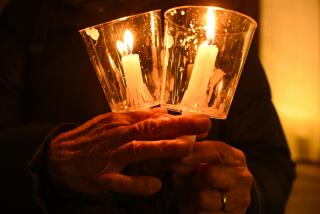Croatian President Brings Israel Olive Branch
JERUSALEM — Tommy Lapid, an Israeli legislator and Holocaust survivor, had to think twice about whether to attend Wednesday’s special parliamentary session in honor of Croatia’s president, Stipe Mesic.
Haunted by his own family’s ordeal, the Yugoslav-born Lapid also recalled the tens of thousands of Jews killed in the Balkans in World War II, when a Nazi puppet regime ruled Croatia and ran the Jasenovac extermination camp. Former Croatian President Franjo Tudjman, until his death in 1999, was persona non grata here for revisionist writings that minimized Jewish suffering in the Holocaust.
But Mesic this week became the first Croatian president to visit Israel, bringing with him a message that Croatia is changing. And most important to Israelis, he repudiated the actions of the Ustashe, Croatia’s wartime regime, and apologized for the slaughter of Jews.
“I never imagined that one day I would stand on the Knesset [parliament] podium and congratulate the president of Croatia,” Lapid told the gathered lawmakers. “But Mr. President . . . I have decided to congratulate you.”
Mesic used his appearance before the Knesset, and an earlier visit to Jerusalem’s Yad Vashem Holocaust Memorial, to “wipe the sins that cast a shadow” over Israeli-Croatian relations. “I seek forgiveness from everyone ever harmed by Croats--and today, especially, the Jews,” he said at Yad Vashem, on the steps of a monument that memorializes 1.5 million children killed in the Holocaust.
Beyond the symbolism and moral journey, Mesic wants better ties between the two nations in order to boost trade and Israeli investment in Croatia’s slowly privatizing economy. Accompanied by a delegation that included several businessmen, Mesic listed technology and tourism among the fields ripe for investment.
Israel’s weapons industry, meanwhile, has long sought wider entry to the Croatian market.
Politically, the Israeli government is hoping to gain an ally in Europe that may be more sympathetic to its positions in the conflict with the Palestinians than some European nations have been. The role of Croatia and other Balkan nations could grow as they move closer to the West and possible inclusion in the European Union and North Atlantic Treaty Organization.
“Europe is changing, and Central Europe is getting higher priority in Israeli foreign policy,” said David Peleg, an Israeli Foreign Ministry official who specializes in Europe.
Mesic’s visit made for some strange sights. The Croatian flag fluttered alongside the Israeli Star of David outside the Knesset, the presidential residence and on main streets. The Croatian flag is distinguished by a red-and-white checkerboard coat of arms, a symbol of Croatian nationalism that was also used by the Ustashe regime.
Mesic took a somber tour of Yad Vashem’s museum, which chronicles the horrors of the concentration camps, the Warsaw Ghetto, medical experiments at Auschwitz and the organization of Jewish resistance fighters--in the Balkans and elsewhere.
For Croatian-born Israeli Yohana Haas, 62, Mesic’s visit represented a “closing of the circle.”
Haas was born in the same town as Mesic, who has said he remembers as a child seeing Jews being taken away but didn’t understand what was happening. Haas was 2 when his parents were sent to Jasenovac, where they died. He was saved and hidden by a Croatian couple.
“In the same nation, it was divided: Some took part in the extermination, others were my saviors,” said Haas, who with his wife, Esther, was invited to accompany Mesic on the tour. “People in Israel know of the crimes. They need to know the rest.”
In a solemn ceremony in Yad Vashem’s cavernous Hall of Remembrance, Mesic placed a red, white and blue wreath--Croatia’s national colors--on the black granite slab that holds ashes of victims from six death camps. The names of many camps are engraved on the floor, including that of Jasenovac, a killing field about 60 miles southeast of Croatia’s capital, Zagreb. In addition to Jews, huge numbers of Serbs and Gypsies were slaughtered by the Ustashe at Jasenovac.
Mesic appeared moved by the ceremony, wiping his face with a handkerchief at one point.
Despite opposition from Croatian nationalists, Mesic since his election last year has embarked on efforts to make his country more democratic and to end Croatia’s role as a haven for war criminals. Mesic was the last president of federated Yugoslavia before it began to crumble in 1991.
In his Knesset address, Mesic cited the Balkan wars as he offered one piece of advice for Israel in its conflict with the Palestinians. “I know what I say when I say that it is better to negotiate for 10 years than to fight a war for 10 days,” he said.
Responding, Israeli Prime Minister Ariel Sharon said there would be no negotiations until terrorism completely ends.
More to Read
Sign up for Essential California
The most important California stories and recommendations in your inbox every morning.
You may occasionally receive promotional content from the Los Angeles Times.











